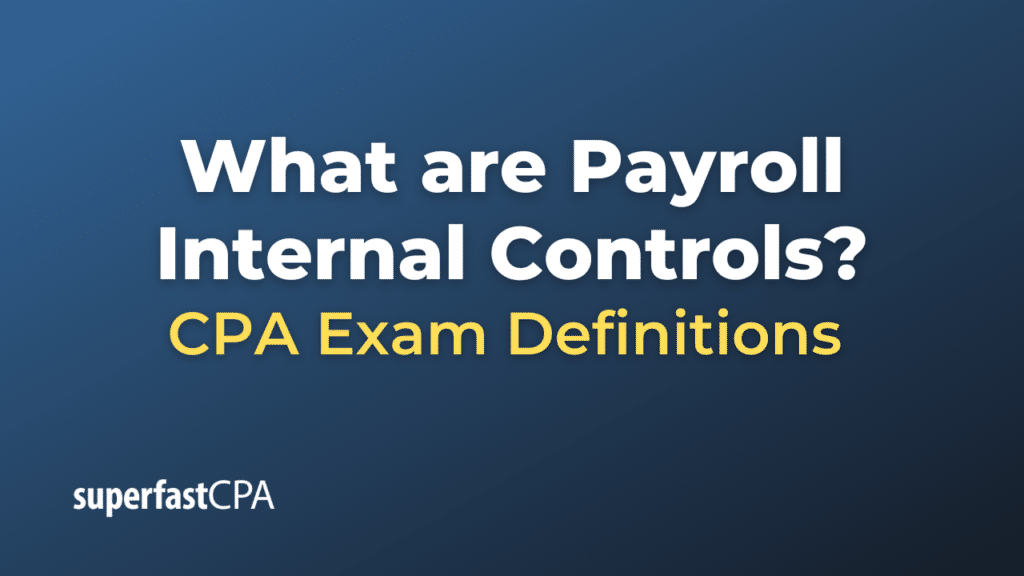Payroll Internal Controls
Payroll internal controls are systems or procedures set up by a business to ensure the accuracy and integrity of its payroll processes. These controls help prevent errors and fraud, safeguard company assets, ensure compliance with laws and regulations, and promote efficient operations.
Here are several examples of payroll internal controls:
- Segregation of Duties: One of the most basic internal controls is to ensure that no single individual has control over all parts of a payroll transaction. For example, the person who calculates payroll should not be the same person who distributes paychecks. This helps prevent any single individual from being able to commit and conceal fraud.
- Authorization and Approval: All changes to pay rates, additions or terminations of employees, and overtime work should require authorization and approval from a manager or other responsible individual. This ensures that payroll changes are accurate, necessary, and consistent with company policy.
- Physical and Information Security: Payroll checks, records, and data should be securely stored to prevent theft or manipulation. This could include locked storage for physical documents and password protection, encryption, and access controls for digital data.
- Payroll Reconciliations: Regular reconciliation of the payroll register with the general ledger and bank statements can help detect any discrepancies or errors. Any discrepancies should be investigated and resolved.
- Timekeeping Controls: Accurate recording of hours worked is crucial to ensuring employees are paid correctly. This can be facilitated by automated timekeeping systems, supervisory review of time records, and controls to ensure that only the employee can report their own hours.
- Training and Education: Regular training and education for payroll staff and managers can help ensure they understand their responsibilities, company policies, and relevant laws and regulations. It can also help them detect potential fraud or errors.
Implementing strong payroll internal controls can reduce the risk of financial loss, legal problems, and damage to a company’s reputation. It can also provide managers and stakeholders with confidence in the company’s financial reporting.
Example of Payroll Internal Controls
Let’s imagine a medium-sized tech company named “TechFusion” and walk through some of their payroll internal controls:
- Segregation of Duties: At TechFusion, the responsibility of payroll processing is divided among several staff members. One employee is responsible for gathering and verifying timesheets, a second employee runs the payroll calculations, and a third employee, usually a manager or supervisor, authorizes the payroll before it is processed. A different department, usually finance or accounting, is responsible for reconciling payroll expenses with the general ledger and bank statements.
- Authorization and Approval: Any changes to an employee’s pay rate, position, or employment status must be approved by a department manager and documented by HR before they’re implemented into the payroll system.
- Physical and Information Security: All physical payroll records at TechFusion are kept in a locked filing cabinet in a secure area. Electronic payroll records are kept on a secure server with access limited to authorized personnel. Regular backups of the electronic data are conducted and stored securely.
- Payroll Reconciliations: At the end of each pay period, the accounting department at TechFusion reconciles the payroll register against the company’s bank account and general ledger to ensure that the correct amounts were paid and posted.
- Timekeeping Controls: TechFusion uses an automated timekeeping system where employees log their hours electronically. Each employee’s hours are then reviewed and approved by their direct supervisor before being submitted to payroll. In addition, the system requires a unique login for each employee, which reduces the risk of someone else clocking in or out for the employee.
- Training and Education: TechFusion provides regular training sessions to payroll and HR staff to update them on any changes in labor laws, company policies, or payroll procedures. This ensures the staff handling payroll have the necessary knowledge to perform their duties accurately and efficiently.
By having these controls in place, TechFusion helps ensure its payroll processes are accurate, its financial data is reliable, and it is in compliance with applicable laws and regulations.













